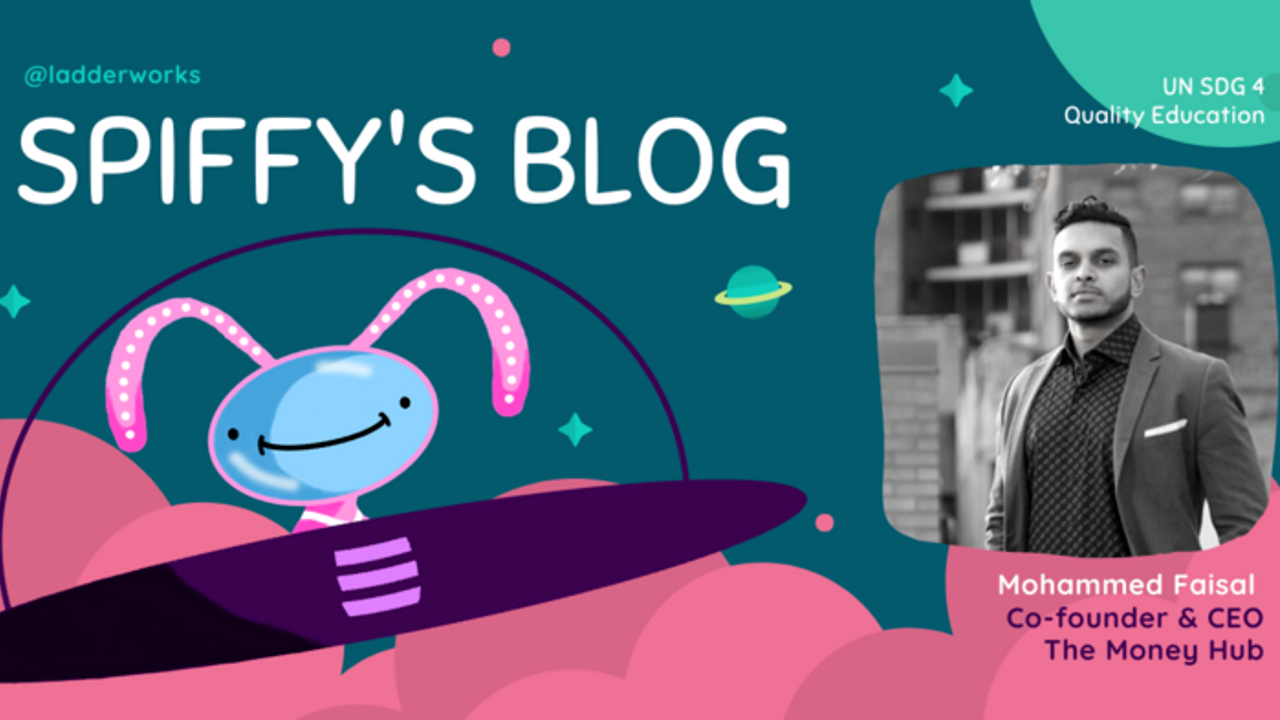
Mohammed Faisal: Making Financial Education Accessible to Teens
Hello! My name is Spiffy, an Interplanetary Journalist reporting from Planet Earth. I’ve been speaking with innovators from around the world who are working to make the world more equitable through educational innovations. One of those people is Mohammed Faisal, co-founder, and CEO of The Money Hub, from Queens, New York. Join me as I see what he’s doing!
Spiffy: Thanks so much for taking the time to talk to me today, Mohammed. Let’s jump right in! Can you tell me about the challenge you are addressing?
Mohammed: Thanks so much for having me, Spiffy. Money Hub NYC is working to provide high-quality financial education for disadvantaged teens.
Spiffy: I see! What motivated you to work on financial literacy for disadvantaged teens?
Mohammed: Growing up as a family of immigrants from Bangladesh living in low-income neighborhoods, we faced displacement due to gentrification. In 2007, we got priced out of our neighborhood, but my mom was able to mortgage us a home. I took that feeling of finally having a home with me to high school, where I met kids from all over the city who were dealing with the same issue of displacement, as well as a lack of high-quality financial education in public schools. In 2016, I formed the Money Hub, where we create curriculum and technology, then partner with schools, to teach financial literacy to teens. I’m driven by the urge to help teens develop a strategy to achieve their dreams and live happier lives as adults.
Spiffy: I can see how personal experience would be a key motivating factor! How is Money Hub NYC working towards creating a more equitable world?
Mohammed: The vast majority of students we have taught are Black and Hispanic teens from New York City’s unbanked neighborhoods, where there are higher rates of poverty and unemployment, and lower credit scores and medium household income. Many people are then forced to turn to alternative financial institutions, such as check-cashing places and payday loans. So our approach is to educate youth before they experience financial pitfalls as a way of filling that void that banks are creating. In this way, we are tackling both economic injustices and racial injustices.
Spiffy: That’s amazing, Mohammed. I’m curious if you’ve reached any new milestones lately.
Mohammed: Actually, Spiffy, we are launching our digital financial literacy gaming platform which will allow us to reach more students and scale faster.
A workshop participant using The Money Hub's financial literacy gaming app in class. (Image courtesy of Mohammed Faisal)
Spiffy: Have you ever experienced failure? What did you learn from it?
Mohammed: When the pandemic hit NYC in March 2020, our in-person sessions were canceled. Our team got together and developed plans to build out a digital remote learning platform that encompassed all that we did, including gamification, simplification, competition, rewards, and accessibility. In the face of a crisis, we emerged poised to ring in the future of education through our platform.
Spiffy: Can you tell me about a project you’ve worked with that exemplifies the impact you’re striving to make?
Mohammed: As part of our curriculum we've taught entrepreneurship to teens who were being exposed to it for the first time. We helped them build out a pitch deck and actually make a pitch to potential investors. That curriculum is now on our platform, along with a library of entrepreneurs sharing their journey and tips for young entrepreneurs.
Spiffy: Before we sign off, is there anything else you would like to tell our audience?
Mohammed: In January of 2019, I was involved in a car accident and suffered a traumatic brain injury. As a result, I've been rehabbing ever since. It’s been the toughest battle of my life, and I've become more resilient and committed to the mission of teaching financial literacy than ever before. As soon as I was out of the hospital, I went to schools to talk to teens about the importance of emergency savings. My team stayed committed—and through that and Covid-19—we have survived and continue to grow.
Spiffy: What an inspiration, Mohammed. I hope this growth and commitment continues! Thanks for taking the time to share with me, it’s been an honor.
Mohammed Faisal is the co-founder and CEO of The Money Hub, a start-up with the mission of teaching financial literacy. He left his accounting job to turn his project into a company. In the years, since his company has served over 4,000 kids and students who entered college with a credit history. They have developed an innovative curriculum and a digital gaming app. He believes that everyone has the right to pursue their dreams and he wants to provide youth with the tools to do so, without money being the obstacle. (Nominated by ImpactHub New York)
© 2020 Ladderworks LLC. Edited by Jill Landis Jha. Spiffy’s illustration by Shreyas Navare. Follow Spiffy’s stories of founders building a more equitable world at www.ladderworks.co/blogs/spiffys-blog




